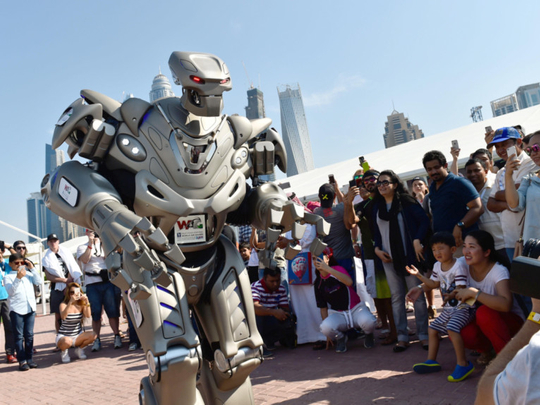
Semi-automated truck convoys are soon to be tested on the roads of United Kingdom. Perhaps, one day, human beings won’t be allowed to drive. Perhaps it will be considered too risky to put an easily distractible human being in charge of a tonne or more of fast-moving metal. Future generations may think of driving as terrifyingly retro.
It’s yet another example of a pressing existential question, as well as an economic one. When clever robots have taken most of our jobs, how will we live and what will we live on? For these Meccano scabs are not only going after the repetitive tasks of the long-distance lorry driver or factory workers. Once they pass the Turing test and can successfully fob themselves off as human beings, jobs that used to require a university degree will be just as much at risk. Human beings are fast heading for obsolescence.
Optimists argue that new jobs will be created, just like they were during the Industrial Revolution and the computer revolution. After all, if no one has a paid job, who will be buying all the stuff that the robots are busy making? Others suggest that with all this robot-led productivity, societies will become rich enough to pay their populations a citizen’s income — that is, provide everyone with an unconditional sum of money to live on, irrespective of whether they work or not. This is an idea that may be approaching as fast as the driverless car. From the United States President Donald Trump-supporting tech CEO Elon Musk to the lefty Greek politician Yanis Varoufakis, the idea of a basic citizen’s income draws support from across the political spectrum.
Now, I am not an economist, and I don’t know whether the sums will ever add up to make it work. But I do know a little about how it might feel to live on a citizen’s income because the nearest real-life comparison I can think of is my own situation. I am not paid a salary by the church. I am paid a stipend. And the crucial difference is that a stipend is not supposed to be a payment received for services rendered. Rather, it is a way for the church to support its clergy so that they can do their thing without a concern for basic material welfare. There is no bonus either. There is not a quota for souls saved. Being a priest is not really a proper job — it’s not something that can be measured in terms of task. The stuff I absolutely have to do, task-wise, is pretty minimal. Even so, the church gives me a place to live and pays me every month.
When first ordained, I couldn’t figure out if I was incredibly lazy or fast becoming a workaholic. And that’s because the stipend system erases the dividing line between what is work and what is not work. I feel constantly busy, but I don’t always know under what category I would file much of my activity. As many clergy will attest, it is in this curious intermediate overlap between work and not work that the most important stuff often happens. The random conversations, the time given over to just sitting with people, the hands that have been held and the books that have been read.
This could be the future for many of us. Under capitalism, many find it hard to establish a sense of self-worth without paid employment. The possibility of a citizen’s income hints at a return to pre-capitalist sources of value. Less about money, and more about things that are distinctively human — things that robots cannot do.
The idealistic best-case scenario for a post-work future is that the economic growth of the robotic/artificial intelligence revolution will enable many of us to work in ways that capitalism has typically undervalued. But if that doesn’t happen, and the robots take our jobs and offer nothing in return, then our future is bleak indeed. Think John Connor in Terminator, leading a neo-luddite revolution.
A citizen’s income is not a free handout for the undeserving — though it would erase that much-abused distinction between the deserving and the undeserving. After all, who can possibly be described as undeserving of having enough to live on? A citizen’s income would be a way for the wealth that is generated by a society to be shared within that society. And the Protestant work ethic would become a thing of the past.
— Guardian News & Media Ltd
Dr Giles Fraser is priest-in-charge at St Mary’s Newington in south London and the former canon chancellor of St Paul’s Cathedral.









